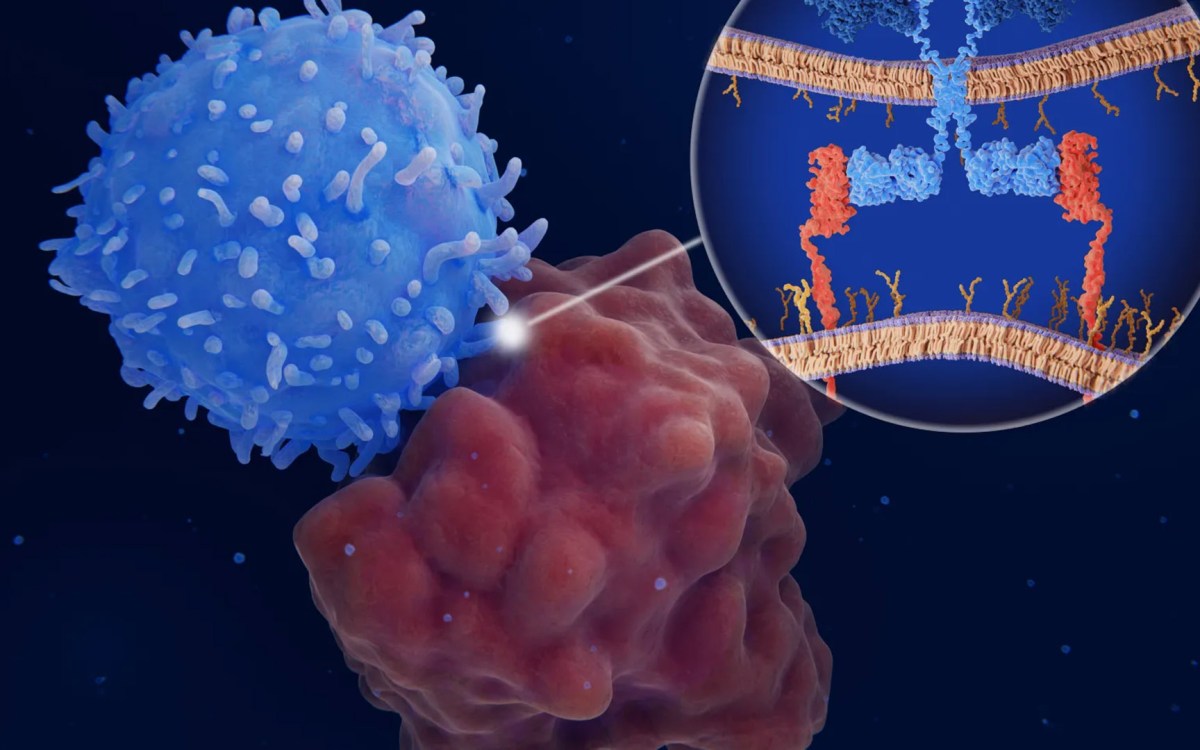Health
-

-

Taking the measure of legal pot
Researchers detail what we know about consequences for revenue and health — and what we still need to find out
-

Riskier to know — or not to know — you’re predisposed to a disease?
‘DNA isn’t a crystal ball for every kind of illness’ but potential benefits outweigh fears, says geneticist

-

As wave of dementia cases looms, Law School looks to preserve elders’ rights
Academic experts seek improvements that could protect decision-making authority and autonomy
-

Who decides when doctors should retire?
Expert in law, bioethics sees need for cognitive testing amid graying of nation’s physician workforce
-

Unlocking the promise of CAR-T
Research on multiple fronts seeks to expand impact of a cancer therapy that has left patients and doctors awestruck

-
Green vegetables and fruits rich in vitamin C reduces risk of heart disease
Regularly eating fruits and vegetables, in particular green leafy vegetables and fruits that contain vitamin C, reduces the risk of coronary heart disease, according to researchers from the Harvard School…
-
Gene found for rare bone disorder
Cherubism may sound angelic, but it certainly is not. The rare bone disorder afflicts children starting at about age 3 or 4, causing them to develop chubby cheeks and upward-looking…
-
Breathing new life into asthma therapy
Asthma attacks have lasting effects because the lungs’ most delicate airways can become scarred. This makes future attacks all the worse. Researchers at Harvard Medical School have looked at what…
-
Introducing baby to the right bacteria
Developing a symbiotic relationship with the right bacteria is essential for a baby’s health and development. W. Allan Walker, a researcher at Harvard Medical School and Massachusetts General Hospital, has…
-
Breast-feeding may limit teenage obesity
Infants who were breast-fed more than formula-fed, or who were breast-fed for longer periods, had approximately 20 percent lower risk of being overweight in their preteen and teen years, according…
-
New drug dissolves stomach tumors
Since July 2000, Harvard and Dana-Farber Cancer Institute researcher George Demetri and his colleagues have treated 148 patients with a rare, lethal stomach cancer known as GIST (Gastrointestinal Stromal Tumor).…
-
A potential new anthrax therapy
A vaccine to protect humans against anthrax already exists, but since infection is rare, a widespread vaccination program is not practical. To be effective against anthrax, antibiotics must be given…
-
Caffeine linked to protection from Parkinson’s disease
Parkinson’s disease is a progressive nervous disease occurring generally after age 50. It destroys brain cells that produce dopamine and is characterized by muscular tremor, slowing of movement, weakness and…
-
Medicare rules restrict good care for dying patients
Many health care providers believe that Medicare regulations block them from providing good care to dying patients. Researchers from Harvard Medical School, the Harvard School of Public Health, and RAND…
-
Nurse staffing levels directly impact patient health and survival
Researchers who looked at hospital discharge data for more than 5 million patients found consistent relationships between nurse staffing levels and five adverse patient outcomes: urinary tract infections, pneumonia, shock,…
-
Women’s menstrual cycle holds clue to cocaine response
During the first half of their menstrual cycles, when their estrogen levels are high, women are protected from the brain-damaging effects of cocaine use, according to a research study conducted…
-
Circadian rhythms may distinguish Alzheimer’s disease
Researcher David Harper and his colleagues monitored two key components of the circadian system — the rise and fall of core body temperature and the waxing and waning of spontaneous…
-
First domino falls in research on sense of touch
Unlike the other four senses, touch is ubiquitous, involving sensory terminals dispersed over the outside and on the inside of the body. This system encodes a variety of sensations in…
-
Scientists look people in the ‘I’
Harvard researchers seek a scientific answer to a question posed by 16th century philosopher René Descartes: “What is this ‘I’ that I know?” “Understanding the brain essence of self-awareness helps…
-
Pain promoter plays unexpected role in central nervous system
Despite all the attention it draws in patients, pain has only in recent years been deemed a subject worthy of scientific scrutiny.
-
Accomplice fingered in cholera toxicity
A study published in March 2001 revealed one of the ways that cholera toxin hijacks some of the cell’s own machinery. In uncovering part of the toxin’s trail, a team…
-
Non-smoking bar and restaurant workers inhale as much as active smokers
Working in a bar or restaurant can expose you to as much tobacco smoke as if you were an active smoker, a researcher based at the Harvard School of Public…
-
Strict enforcement of lead-exposure-prevention policies shows clear benefits
Even at low levels, lead poisoning in children can cause IQ deficiencies, reading and learning disabilities, impaired hearing, reduced attention spans, hyperactivity and other behavior problems. Children who live in…
-
Cancer cells’ immortality may depend on longevity protein
A team of Harvard Medical School researchers has identified a protein that 10 percent of tumor cells use to attain an immortal state. By blocking the molecule, it may be…
-
Human genome tally: Is recount in order?
The surprising finding that humans have fewer genes than expected led to endless speculations and editorial comments. Would biotech stocks be threatened? Should humans be more humble? Were entirely new…
-
Nonsmoking college students 40 percent less likely to take up smoking when they live in smoke-free dorms
Although 81 percent of colleges prohibit smoking in all public areas, only 27 percent prohibit smoking in students’ dormitories. Harvard School of Public Health researchers say the finding sends a…
-
Rules for music wired into the brain
“Music is in our genes,” says Mark Jude Tramo, a musician, prolific songwriter, and neuroscientist at Harvard Medical School. “Many researchers like myself are trying to understand melody, harmony, rhythm,…
-
Testing to identify drug-resistant AIDS strains is cost-effective
A new study led by the Harvard Center for Risk Analysis, published in the Annals of Internal Medicine in March 2001, finds that testing people with HIV to determine whether…
-
Surgery without scalpels
Paul Simmons, a 29-year-old Maine farmer, suffered from a lung tumor. In February 2001, at Harvard-affiliated Brigham and Women’s Hospital in Boston, a probe containing a long needle was inserted…
-
Medicare patients give higher overall marks to nonprofit health plans
The first large-scale national study that examines the relationship between health plan characteristics and patient ratings of their plan found that Medicare patients prefer not-for-profit or local plans over for-profit…
-
Majority of Alzheimer’s plaques cleared from brains of living mice
Harvard Medical School researchers, working with scientists at Elan Pharmaceuticals, cleared 70 percent of Alzheimer’s plaques from the brains of mice by applying anti-plaque antibodies directly to the mouse brains…
-
Brain hesitates in assembling mosaic of motion
Your brain must integrate information from many different neurons in the primary visual cortex to interpret movement. But how does this complicated process work? Richard Born and Christopher Pack of…
-
Lyme disease vaccine found cost-effective only for those at high risk
Lyme disease, a bacterial infection transmitted through deer tick bites, is rapidly emerging in the U.S. and currently affects about 15,000 people each year. But incidence varies widely according to…
-
Simulating disease trends with massive mathematical models
Researcher Karen Kuntz is currently developing a model to evaluate trends in colorectal cancer incidence and mortality. Nearly 50,000 Americans die each year from the disease, despite the fact that…
-
How embryonic stem cells become fine-tuned brains
Research by Michael Greenberg, Harvard Medical School professor of neurology at Children’s Hospital, begins to explain how the embryonic brain’s stem cells decide whether to mature into nerve or glial…


